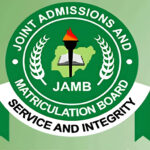
In its efforts to tackle examination malpractices, the Joint Admissions and Matriculation Board (JAMB) has introduced more sophisticated devices designed specifically to detect infractions of any form before, during and even after examinations conducted by the board.
Registrar of the board, Prof. Ishaq Oloyede, who disclosed this in an interview with journalists while monitoring the ongoing Unified Tertiary Matriculation Examination (UTME) at some Computer-Based Test (CBT) centres in Lagos, expressed satisfaction with the conduct of the exam, saying the level of malpractice and other infractions have reduced greatly.
He said: “Right now, we have better devices to detect whatever is happening, irrespective of where it is happening, before, during and even after the examination. If you look at the situation in the past, prior to this year, it was possible for examinations to be disrupted; impersonation and malpractices have dropped drastically and we are inching towards zero level.”
The registrar urged candidates to stay focused, work hard and shun vices capable of compromising their future, while reminding that there was no short cut to success.
Oloyede said reports from centres across the country indicated that the examination has been hitch free.
“Right now, I will say that the examination is going the way it is designed to and I must say that I am very happy about it. I am impressed that even throughout the country, the level of examination malpractice and other vices have reduced.
“In fact, it is below international standard, in terms of examination malpractice and that is good. This is particularly coming from a place like Lagos that used to be the hub,” Oloyede said. He added that one of the challenges the board has tried to address this year is delay in the commencement of the examination.
According to him, once there is a delay in the commencement of the examination, say for one hour or one and a half hours after the commencement of the examination in any part of the country, candidates cannot sit for that examination.
“We will rather cancel it, because it is no longer valid. This is because the items we have scheduled for that session have been taken elsewhere and it will no longer be proper for us to run it. This is also one of the ways to check examination malpractices,” he stated.
Oloyede, however, regretted the glitches initially experienced in some states on the first day of the examination, saying the challenges had since been addressed. He disclosed that most of the candidates affected had since been rescheduled, urging those who were yet to sit for the examination to check their profiles and the SMS of their handsets.
Oloyede expressed satisfaction with the performance of the various centres nationwide, as well as other stakeholders who cooperated with the board in ensuring that the integrity of the examination was not compromised.
The registrar noted that so far, a total of 1.5 million out of the 1.6 million candidates that registered for the examination ought to have been tested but for the rescheduling that occurred.












